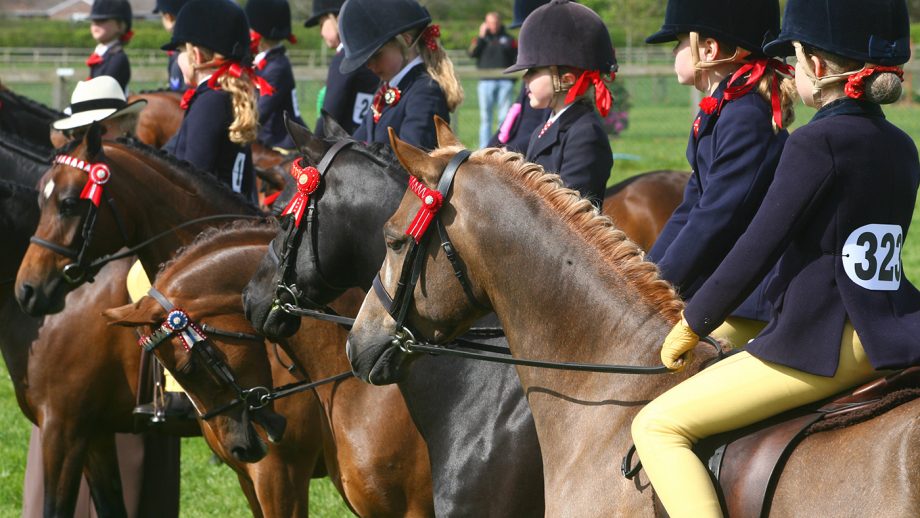While we come to terms with the new normal for equestrian sport, there are some good things that have come about as a result of the pandemic. H&H finds out more...
From jumping on hallowed turf and posing in the Grand National winners’ enclosure to calmer warm-ups – there have been positives that would not have come about without the effects of Covid-19.
H&H spoke to numerous riders and their supporters at the British Showjumping (BS) National Championships (3–11 August), which were moved to Bolesworth Castle at a few weeks’ notice.
{"content":"PHA+QWxsIHNwb2tlIG9mIHRoZWlyIGRlbGlnaHQgYXQgYmVpbmcgYWJsZSB0byBqdW1wIGF0IHN1Y2ggYSBwcmVzdGlnaW91cyB2ZW51ZTsgQlMgY2hpZWYgZXhlY3V0aXZlIElhaW4gR3JhaGFtIGV4cGxhaW5lZCB0aGF0IHRoZSBzaG93IGNvdWxkIG5vdCBub3JtYWxseSBoYXZlIHJ1biBhdCB0aGlzIHRpbWUgb2YgeWVhciwgYXMgdGhlIHZlbnVlIHdvdWxkIG5vdCBoYXZlIHJlY292ZXJlZCBmcm9tIGZhbWlseSBtdXNpYyBhbmQgbW90b3JpbmcgZmVzdGl2YWwgQ2FyRmVzdCB0aGVyZSBpbiBKdWx5LjwvcD4KPHA+4oCcQ292aWQgYWxsb3dlZCB1cyB0byBnbyB0byBCb2xlc3dvcnRoIHRoaXMgeWVhcizigJ0gaGUgdG9sZCA8ZW0+SCZhbXA7SDwvZW0+LiDigJxIYXZpbmcgYSBwdXJwb3NlLWJ1aWx0IHZlbnVlIHRvIGhvbGQgdGhlIGNoYW1waW9uc2hpcHMsIGluIGZyb250IG9mIHRoYXQgc3BlY3RhY3VsYXIgYmFja2Ryb3AsIHdhcyByZWFsbHkgbmljZSwgYW5kIHRoZSB0ZWFtIGRpZCBhIGdyZWF0IGpvYiBpbiBtYWtpbmcgZXZlcnlvbmUgZmVlbCBzcGVjaWFsLCBhcyB3ZWxsIGFzIHNhZmUu4oCdPC9wPgo8cD5NciBHcmFoYW0gc2FpZCBoZSB0aGlua3MgcmlkZXJzIGFyZSBhcHByZWNpYXRpbmcgdGhlIHF1YWxpdHkgY2VudHJlcyBhbmQgc2hvd3Mgb24gb2ZmZXIgYWZ0ZXIgbW9udGhzIG9mIG5vdCBiZWluZyBhYmxlIHRvIGNvbXBldGUuPC9wPgo8cD48ZGl2IGNsYXNzPSJhZC1jb250YWluZXIgYWQtY29udGFpbmVyLS1tb2JpbGUiPjxkaXYgaWQ9InBvc3QtaW5saW5lLTIiIGNsYXNzPSJpcGMtYWR2ZXJ0Ij48L2Rpdj48L2Rpdj48c2VjdGlvbiBpZD0iZW1iZWRfY29kZS0zMSIgY2xhc3M9ImhpZGRlbi1tZCBoaWRkZW4tbGcgcy1jb250YWluZXIgc3RpY2t5LWFuY2hvciBoaWRlLXdpZGdldC10aXRsZSB3aWRnZXRfZW1iZWRfY29kZSBwcmVtaXVtX2lubGluZV8yIj48c2VjdGlvbiBjbGFzcz0icy1jb250YWluZXIgbGlzdGluZy0tc2luZ2xlIGxpc3RpbmctLXNpbmdsZS1zaGFyZXRocm91Z2ggaW1hZ2UtYXNwZWN0LWxhbmRzY2FwZSBkZWZhdWx0IHNoYXJldGhyb3VnaC1hZCBzaGFyZXRocm91Z2gtYWQtaGlkZGVuIj4NCiAgPGRpdiBjbGFzcz0icy1jb250YWluZXJfX2lubmVyIj4NCiAgICA8dWw+DQogICAgICA8bGkgaWQ9Im5hdGl2ZS1jb250ZW50LW1vYmlsZSIgY2xhc3M9Imxpc3RpbmctaXRlbSI+DQogICAgICA8L2xpPg0KICAgIDwvdWw+DQogIDwvZGl2Pg0KPC9zZWN0aW9uPjwvc2VjdGlvbj48L3A+CjxwPuKAnEnigJltIHN1cmUgaXQgZmVsdCB2ZXJ5IHNwZWNpYWwgZm9yIG1lbWJlcnMgdG8gYmUgYWJsZSB0byByaWRlIGluIHRoZSBhcmVuYXMgdGhleeKAmXZlIHNlZW4gdGhlaXIgaGVyb2VzIGluOyB0aGV5IGFsbCBjYW1lIG91dCB3aXRoIGJpZyBzbWlsZSByZWdhcmRsZXNzIG9mIHJlc3VsdHMs4oCdIGhlIHNhaWQuIOKAnEkgc2F3IHRoZSBCUyBBY2FkZW15IGNoaWxkcmVuIGFycml2aW5nIGFuZCB0aGVpciBleGNpdGVtZW50IG1hZGUgdXMgYWxsIHJlbWVtYmVyIHdoeSB3ZeKAmXJlIHB1dHRpbmcgdGhlIGhvdXJzIGluIHRvIGdldCB0aGUgc3BvcnQgcnVubmluZy7igJ08L3A+CjxwPkF0IEFpbnRyZWUgSW50ZXJuYXRpb25hbCBFcXVlc3RyaWFuIENlbnRyZeKAmXMganVuaW9yIHNob3cgKDE04oCTMTYgQXVndXN0KSwgbm9ybWFsIHByaXplLWdpdmluZ3Mgd2VyZSBvZmYsIHNvIGVxdWVzdHJpYW4gY2VudHJlIG1hbmFnZXIgQ2FybHkgU2FnZSBjYW1lIHVwIHdpdGggYW4gYWx0ZXJuYXRpdmUuPC9wPgo8cD7igJxJdCB3YXMgYSBzcHVyLW9mLXRoZS1tb21lbnQgdGhpbmcs4oCdIHNoZSB0b2xkIDxlbT5IJmFtcDtIPC9lbT4uIOKAnEkgc3Bva2UgdG8gdGhlIHBob3RvZ3JhcGhlciwgZ3JhYmJlZCBoaXMgc3BhcmUgY2FtZXJhIGFuZCBoZWFkZWQgZm9yIHRoZSB3aW5uZXJz4oCZIGVuY2xvc3VyZS48L3A+CjxkaXYgY2xhc3M9ImFkLWNvbnRhaW5lciBhZC1jb250YWluZXItLW1vYmlsZSI+PGRpdiBpZD0icG9zdC1pbmxpbmUtMyIgY2xhc3M9ImlwYy1hZHZlcnQiPjwvZGl2PjwvZGl2Pgo8cD7igJxJdCB3YXMgcXVpdGUgZW1vdGlvbmFsIGFzIHdlIGhhZG7igJl0IGhhZCBhIGhvcnNlIGluIHRoZXJlIHNpbmNlIERlY2VtYmVyLCBhbmQgdGhlIGtpZHMgcmVhbGx5IGFwcHJlY2lhdGVkIGl0LCBtb3JlIHRoYW4gSSB0aG91Z2h0IHRoZXkgd291bGQuIEl0IHdhcyBsb3ZlbHkgd2UgY291bGQgZG8gc29tZXRoaW5nIGZvciB0aGVtLiBUaGF0IGFyZWHigJlzIG5vcm1hbGx5IGFic29sdXRlbHkgb3V0IG9mIGJvdW5kcyBhbmQgdGhlIGNoaWxkcmVuIGFwcHJlY2lhdGVkIGhvdyBzcGVjaWFsIGl0IHdhcyB0byBiZSB0aGVyZSwgYW5kIHdpdGhvdXQgdGhlIHJlc3RyaWN0aW9ucywgd2Ugd291bGRu4oCZdCBoYXZlIGRvbmUgaXQu4oCdPC9wPgo8cD5NcyBTYWdlIHNhaWQgdGhlIENvdmlkIHJlc3RyaWN0aW9ucyBtYXkgd2VsbCBoYXZlIG1hZGUgbWFueSB2ZW51ZXMgcmV0aGluayBwcm9jZXNzZXMgZm9yIHRoZSBiZXR0ZXIuPC9wPgo8ZGl2IGNsYXNzPSJhZC1jb250YWluZXIgYWQtY29udGFpbmVyLS1tb2JpbGUiPjxkaXYgaWQ9InBvc3QtaW5saW5lLTQiIGNsYXNzPSJpcGMtYWR2ZXJ0Ij48L2Rpdj48L2Rpdj4KPHA+4oCcQSBsb3Qgb2YgZ29vZCB0aGluZ3MgaGF2ZSBjb21lIG91dCBvZiB0aGlzLOKAnSBzaGUgc2FpZC4g4oCcUHJlLWVudHJ5IGFuZCBkcmF3biBvcmRlcnMgd2l0aCB0aW1lcyBpcyBhIGxvdCBiZXR0ZXIuIFlvdSBrbm93IGhvdyBtYW55IHN0YWZmIHlvdSBuZWVkLCB3aGF0IHRpbWUgeW914oCZbGwgc3RhcnQgYW5kIGZpbmlzaDsgZXZlbiBvbiBhIFtwcmUtQ292aWRdIFdlZG5lc2RheSwgd2Ugd291bGRu4oCZdCBrbm93IGlmIHdl4oCZZCBiZSBqdW1waW5nIDE1MCBvciAzMDAuIFdl4oCZcmUgYWR2ZXJ0aXNpbmcgZm9yIGZvdXIgbW9yZSBzdGFmZiBmb3IgZXZlbnQgZGF5cywgc28gd2XigJlyZSBnaXZpbmcgbW9yZSBwZW9wbGUgdGhlIG9wcG9ydHVuaXR5IHRvIHdvcmssIHRvby7igJ08L3A+CjxwPlJpZGVyIFNhcmFoIEhpZ2dpbnMgYWxzbyBub3RpY2VkIHBvc2l0aXZlcyBhdCB0aGUgcmVzY2hlZHVsZWQgQnJpdGlzaCBEcmVzc2FnZSBXaW50ZXIgQ2hhbXBpb25zaGlwcyAoMTfigJMyMyBBdWd1c3QpLjwvcD4KPGRpdiBjbGFzcz0iYWQtY29udGFpbmVyIGFkLWNvbnRhaW5lci0tbW9iaWxlIj48ZGl2IGlkPSJwb3N0LWlubGluZS01IiBjbGFzcz0iaXBjLWFkdmVydCI+PC9kaXY+PC9kaXY+CjxwPlNoZSBwcmFpc2VkIG5vdCBvbmx5IHRoZSBjaGFtcGlvbnNoaXAgZmVlbCBhbmQgb3JnYW5pc2F0aW9uLCBidXQgYWxzbyBjaGFuZ2VzIHN1Y2ggYXMgdGltZXMgZm9yIHdvcmtpbmcgaW4uPC9wPgo8cD7igJxUaGF0IHdhcyBhIGh1Z2UgYmVuZWZpdDsgZnJvbSBuYXRpb25hbHMgZ29uZSBieSwgaXTigJlzIGJlZW4gYSBiaXQgb2YgYSBmcmVlLWZvci1hbGwgYW5kIGEgYml0IGNyYXp5LOKAnSBzaGUgdG9sZCA8ZW0+SCZhbXA7SDwvZW0+LiDigJxJIHRoaW5rIHRoZXJlIHdpbGwgaGF2ZSBiZWVuIGxvdHMgbGVhcm50LuKAnTwvcD4KPHA+U2FyYWggYWRkZWQgdGhhdCBsb2NrZG93biB3YXMgYWxzbyBhIGdvb2QgYnJlYWsgZm9yIGhvcnNlcyBhbmQgaHVtYW5zLCB3aXRoIG5vIHJ1c2hpbmcgZnJvbSBvbmUgc2hvdyB0byB0aGUgbmV4dC48L3A+CjxwPuKAnEkgaGFkIGZlbHQgc28gZ3VpbHR5IGlmIHRoZSBob3JzZXMgaGFkIGEgY291cGxlIG9mIGRheXMgb2ZmIGlmIEnigJlkIGJlZW4gYXdheSBidXQgcmVhbGlzZWQgdGhyb3VnaCBsb2NrZG93biBJIHdhcyBtb3JlIHJlbGF4ZWQgYW5kIHRoZSBob3JzZXMgdGhlIHNhbWUs4oCdIHNoZSBzYWlkLiDigJxJZiB0aGV5IGhhdmUgYSBjb3VwbGUgb2YgZGF5cyBoYWNraW5nIG9yIGluIHRoZSBmaWVsZCwgaXTigJlzIG5vdCBhIHByb2JsZW0uPC9wPgo8ZGl2IGNsYXNzPSJpbmplY3Rpb24iPjwvZGl2Pgo8cD7igJxJIHRoaW5rIGV2ZXJ5b25l4oCZcyBsZWFybnQgdG8gcmVsYXggYW5kIGxvb2sgYXQgc2hvd3MgbW9yZSBvYmplY3RpdmVseS4gSXTigJlzIHNvIGVhc3kgdG8gZ2V0IGludG8gYSBjeWNsZSBvZiBzaG93cyB3aGVyZSB5b3XigJlyZSBub3QgcGFydGljdWxhcmx5IHRoaW5raW5nIGFib3V0IHdoYXQgeW914oCZcmUgZG9pbmcsIGJ1dCB3ZeKAmXZlIGhhZCB0aW1lIHRvIHRha2Ugc3RvY2ssIGFuZCBhIGJhZCB0ZXN0IGlzbuKAmXQgdGhlIGVuZCBvZiB0aGUgd29ybGQuPC9wPgo8cD7igJxJdOKAmXMgcmVmcmVzaGVkIG15IGVudGh1c2lhc20sIGFuZCBoYXMgZ2l2ZW4gYSBkaWZmZXJlbnQgcGVyc3BlY3RpdmUsIHdoaWNoIEnigJltIGdvaW5nIHRvIHRyeSB0byBrZWVwLuKAnTwvcD4KPHA+Cg=="}
You may also be interested in…
With the coronavirus pandemic forcing most people to work from home, abiding by lockdown rules, and a proportion of those
Doncaster (pictured here in 2018) will be one of the first courses to welcome back spectators.
Credit: PA
Racing crowds are set to be welcomed to three pilot events in September
Credit: David Miller
The Showing Council has set out a blueprint for organisers to help competition resume ‘when it is safe and appropriate
Which one will you be wearing?
Stay in touch with all the news in the run-up to and throughout the major shows and events during 2026 and beyond with a Horse & Hound subscription. Subscribe today for all you need to know ahead of these major events, plus online reports on the action as it happens from our expert team of reporters and in-depth analysis in our special commemorative magazines. Have a subscription already? Set up your unlimited website access now
H&H news editor
Eleanor is an experienced journalist who spent over eight years working for local and national newspapers before joining H&H as news editor in March 2016. Passionate about equine welfare and exposing the truth, Eleanor has reported on all aspects of the industry, from Brexit to anti-bullying campaigns, and from dressage rules to mules. Her sport of choice is showjumping, in which she competes her own horses, and she also enjoys reporting at local jumping shows through to international championships.




